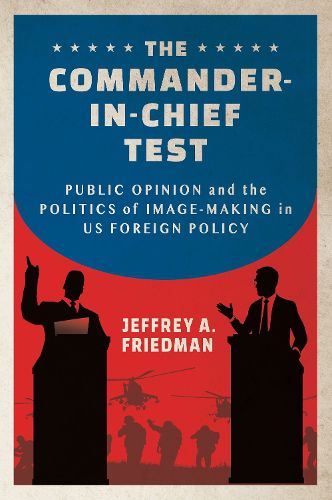Readings Newsletter
Become a Readings Member to make your shopping experience even easier.
Sign in or sign up for free!
You’re not far away from qualifying for FREE standard shipping within Australia
You’ve qualified for FREE standard shipping within Australia
The cart is loading…






In The Commander-in-Chief Test, Jeffrey A. Friedman offers a fresh explanation for why Americans are often frustrated by the cost and scope of US foreign policy-and how we can fix that for the future.
Americans frequently criticize US foreign policy for being overly costly and excessively militaristic. With its rising defense budgets and open-ended "forever wars," US foreign policy often appears disconnected from public opinion, reflecting the views of elites and special interests rather than the attitudes of ordinary citizens.
The Commander-in-Chief Test argues that this conventional wisdom underestimates the role public opinion plays in shaping foreign policy. Voters may prefer to elect leaders who share their policy views, but they prioritize selecting presidents who seem to have the right personal attributes to be an effective commander in chief. Leaders then use hawkish foreign policies as tools for showing that they are tough enough to defend America's interests on the international stage. This link between leaders' policy positions and their personal images steers US foreign policy in directions that are more hawkish than what voters actually want.
Combining polling data with survey experiments and original archival research on cases from the Vietnam War through the occupations of Iraq and Afghanistan, Friedman demonstrates that public opinion plays a surprisingly extensive-and often problematic-role in shaping US international behavior. With the commander-in-chief test, a perennial point of debate in national elections, Friedman's insights offer important lessons on how the politics of image-making impacts foreign policy and how the public should choose its president.
$9.00 standard shipping within Australia
FREE standard shipping within Australia for orders over $100.00
Express & International shipping calculated at checkout
In The Commander-in-Chief Test, Jeffrey A. Friedman offers a fresh explanation for why Americans are often frustrated by the cost and scope of US foreign policy-and how we can fix that for the future.
Americans frequently criticize US foreign policy for being overly costly and excessively militaristic. With its rising defense budgets and open-ended "forever wars," US foreign policy often appears disconnected from public opinion, reflecting the views of elites and special interests rather than the attitudes of ordinary citizens.
The Commander-in-Chief Test argues that this conventional wisdom underestimates the role public opinion plays in shaping foreign policy. Voters may prefer to elect leaders who share their policy views, but they prioritize selecting presidents who seem to have the right personal attributes to be an effective commander in chief. Leaders then use hawkish foreign policies as tools for showing that they are tough enough to defend America's interests on the international stage. This link between leaders' policy positions and their personal images steers US foreign policy in directions that are more hawkish than what voters actually want.
Combining polling data with survey experiments and original archival research on cases from the Vietnam War through the occupations of Iraq and Afghanistan, Friedman demonstrates that public opinion plays a surprisingly extensive-and often problematic-role in shaping US international behavior. With the commander-in-chief test, a perennial point of debate in national elections, Friedman's insights offer important lessons on how the politics of image-making impacts foreign policy and how the public should choose its president.